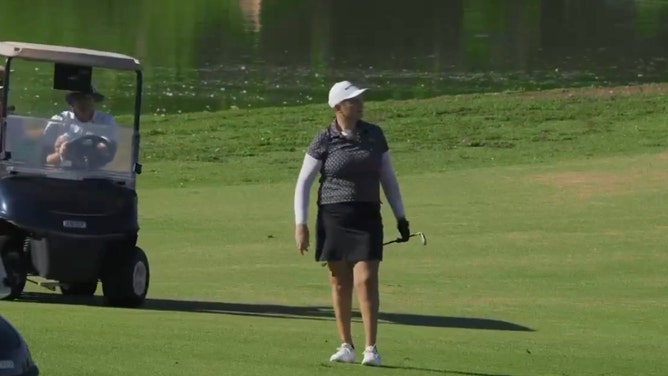Women’s Pro Golfer Talks LPGA Banning Transgender Athletes From Female Events
The LPGA Tour and USGA took a major step this week when they announced that the majority of biological males would no longer be eligible to compete in women's golf events in 2025 and beyond. It was a long-awaited decision that reflects the inarguable biological advantages males have over female athletes.
READ: LPGA, USGA Ban Most Biological Males From Competing In Women's Golf Events; Hailey Davidson Reacts
Many female golfers and athletes have spoken out in favor of the ban and OutKick on Friday afternoon spoke to one of them. Hannah Arnold, a women's professional golfer and Independent Women’s Forum (IWF) ambassador, has been one of the most important voices on this issue and what it means for women's sports.
When asked why this was important to her personally, she said that as an athlete and competitor, she knows the "time and effort" that these "amazing athletes put into their sports." And as such, she was willing to "protect that at all costs," to ensure that "female sports remain female. Period."

Transgender golfer Hailey Davidson. Photo Credit: Riley Gaines
Hannah Arnold Speaks On Support Among Female Athletes
OutKick asked Arnold if she felt that most female golfers supported the LPGA and USGA's decision. As well as questioning why not everyone would be willing to speak out about it.
Arnold said that some golfers are worried about their sponsors, potentially losing important sponsorship money. Or some golfers could be concerned about public activism being a distraction from the incredible amount of work they put in to train for events or qualifying. Still, she says she believes a "majority of women" would speak out if given the opportunity to do so, and that most agree with keeping female sports female.
She also applauded the LPGA and USGA for doing "something spectacular" by being one of the first organizations to make the call to ban transgender athletes. It's "hard to be the first one to do it," to lead from the front, and the hope is that others are willing to fall in behind. Seeing the "really good media and positive feedback" the two golf organizations have received should also help in that regard.
More broadly, there seems to be bizarre resistance to acknowledging that women and men are different with different physical capabilities. When asked about it, Arnold said she believes that "people are generally good people, they want to make people feel included." Sometimes those good intentions mean that reality can be "overshadowed."
"Reality says that women and men are biologically different, and there are things men can do to a golf ball that women will not be able to do," Arnold explained. Ignoring that people who have decided to transition have those advantages is "at the cost of reality."
Arnold also explained that she has "friends that have been affected by the transgender issue in golf and other sports," and that they were "put into a corner" and felt like their "voice was minimized."
It's important, she said, that they realize that they're not alone or that their voice doesn't matter. Unfortunately, it's all too common that opponents make those affected feel like they are and that it doesn't.
Allowing it to get this far in the first place is an "effect of bad policy," Arnold said. And while we can "empathize" with transgender athletes, it wouldn't be disappointing for people like male golfer Hailey Davidson if these rules had been in place already.
Arnold recognized the impact of the women's volleyball players forfeiting their games against San Jose State and trans player Blaire Fleming, but explained why that would be difficult to replicate in women's professional golf.
Qualifying school costs thousands of dollars, so refusing to compete against a transgender player would potentially mean women are out substantial amounts of money. And with limited options already, quitting at this stage could cost you the potential of an entire year on the LPGA Tour.
Still, she believes that the volleyball players refusing to jeopardize their safety have started a "movement" that will spread into other sports. It's about time.